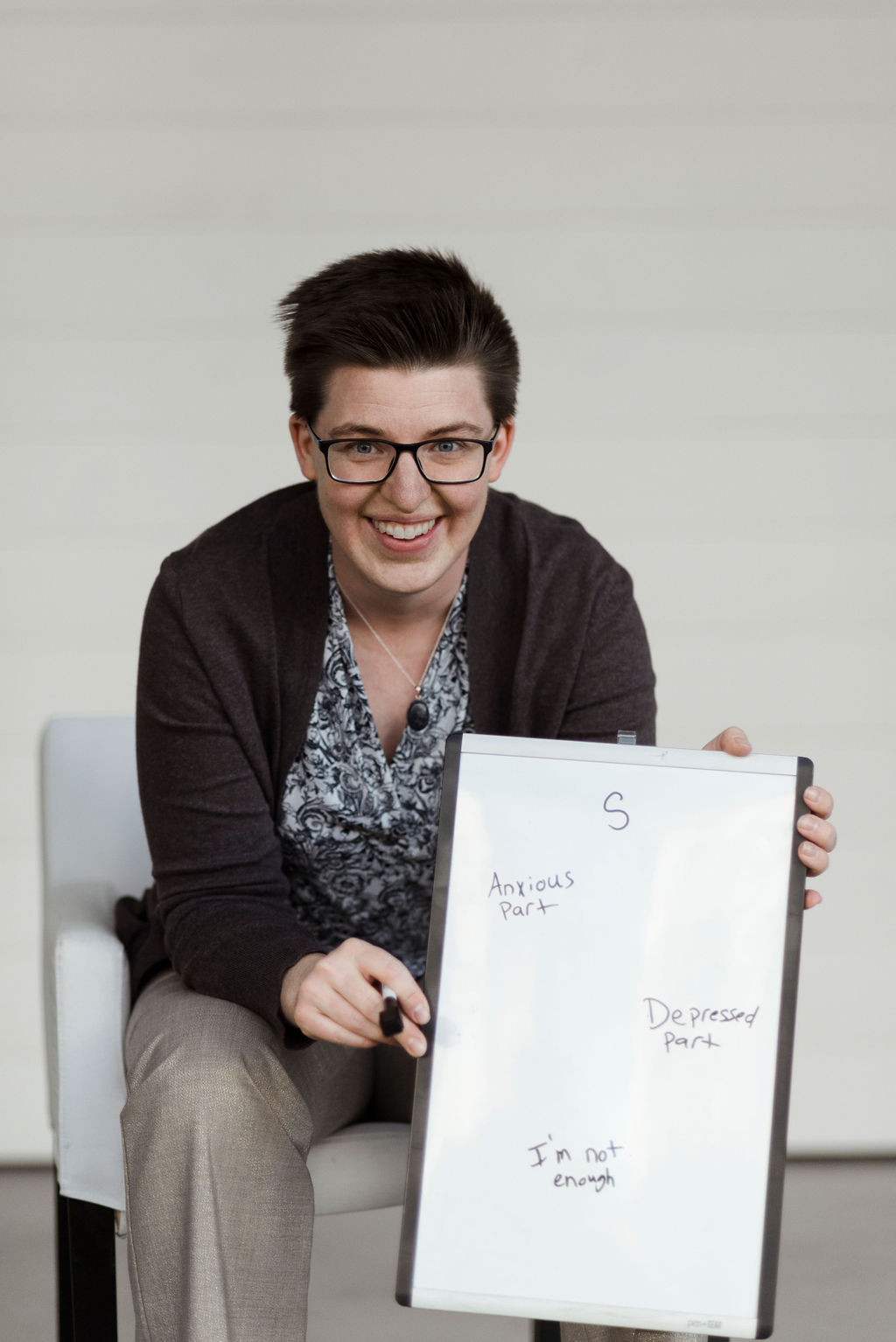Dealing With Depression Is
Exhausting…
Depression CAN be an opportunity to learn to embrace yourself more deeply.


Are you struggling to find satisfaction in your life? Has it become increasingly difficult for you to accomplish things that were once routine habits—like getting out of bed, eating, and getting dressed? Does it feel like a weight is on your shoulders throughout the whole day? At times, depression can feel like it’s taking over, making it hard to find the same sense of satisfaction you once gained from special moments in life.
Depression symptoms can encompass a range of physical, mental, and social consequences for any individual. You may find that you experience cognitive signs of depression, such as mental exhaustion, loss of interest, overthinking, sadness, and frustration. However, depression can also affect your physical health, causing feelings of nausea, a loss of appetite, stomach pain, headaches, sleeping too much or too little, and physical fatigue that makes it hard to take an active role in your life.
Everyone deals with depression differently, and sometimes, unhealthy solutions result in straining our relationships with friends, family, and lovers. For example, you may use work to avoid the underlying turmoil causing you stress. Or you may ignore your responsibilities altogether, falling behind on bills and deadlines while further detaching from the world. For more extreme cases, you may find that you’re contemplating suicide, and if this is the case for you, please reach out to the Colorado Crisis Line by texting “TALK” to 38255 or calling (1-844-493-8255). Depression is an isolating experience, but you don’t have to go through it alone.
Nearly Everyone Experiences
Depression To Some Extent

Feeling depressed is extremely common. How many times have you heard someone you know or someone on TV talk about being depressed? Depression is so common it has become normal for people to mention they are depressed. However, even though you might hear the word depression frequently, most people don’t typically feel comfortable talking about their deep experience with it. This is especially true with suicidal thoughts, however, talking about your true experience in a safe space relieves the pressure of feeling all alone. Despite our tendency to bottle up our emotions as a means of self-preservation, keeping your inner turmoil close can actually be counterproductive to your mental wellness. Openly communicating about your depression may feel difficult, but it may actually make it easier to resolve your feelings.
When you’re depressed, you may deal with it by making unhealthy lifestyle choices which only make it worse. For example, you may fill your diet with junk food, leaving you lethargic, lacking the energy to properly take on life at its most stressful moments. An addiction to alcohol or other drugs may take priority over your health, causing you to forget responsibilities and put self-care on the back burner. Or unhealthy habits such as skipping sufficient sleep cycles, eating too much processed sugar, and living a sedentary lifestyle may all contribute to poor physical/mental health.

Depression can take the wind out of your sails and it shouldn’t be taken lightly. If you’re experiencing severe bouts of isolation, sadness, thoughts of inadequacy, fatigue, headaches, a lack of concentration, hopelessness, or suicidal thoughts you should consider therapy for depression.
Separate Yourself From Depression Through Therapy

Deciding to engage in therapy gives you an opportunity to talk about your experiences with depression. Every one of my clients has different needs, and therapy gives us the space to discover yours. As we build our relationship, we’ll work on separating your depression from your identity so you can see that depression isn’t who you really are, it’s a part of you. After your depression part is externalized you will learn to talk directly to this part of you to help heal it.
In my practice, I provide a compassionate and open environment. During our sessions, I’ll work to tailor therapy to your particular needs. I utilize Internal Family Systems (IFS) as my primary method for depression therapy. IFS is a modality that recognizes the different parts which make up our identities so we can work to understand our needs for healing. My approach also combines aspects of humanism, Person Centered Therapy, and Jungian psychology to help you reach your full potential. I may also invite creative approaches personally tailored to your needs so we can explore new ways of healing. All of these modalities explore the “Self” in different ways. My time is to help you identify your depression, separate it from you, and have its intensity decrease in your life, allowing the true YOU to shine forth.

Depression can feel immobilizing, causing so much hopelessness. But having someone knowledgeable by your side can help you find practical solutions for your problems. Therapy for depression teaches healthy responses to depression so you can begin to look forward to a rewarding, exciting life. I understand you may have questions, and I’m happy to help answer them. The fact that you’re reading this information shows that you’re looking to improve, and that’s something worth pursuing.
Perhaps you’re considering therapy but still have some concerns…
What if therapy is too expensive for me?
Therapy is an investment in yourself that stays with you forever. It’s easy to discount your needs and ignore your emotions, but over time unresolved conflicts can start to compile, leaving you overwhelmed, exhausted, and confused. Prioritizing your own well-being is a worthwhile investment, and therapy for depression can give you the space to see yourself in a new light.
What if I don’t have time for therapy?
I understand attending therapy can be difficult if you have a busy schedule. However, your health is something worth setting the time aside for. It’s easy to be distracted by the world, but with planning, you don’t have to be overwhelmed. In our session, we’ll create a schedule that accommodates your needs. For those with more demanding responsibilities, I have some Saturday and early evening availability as well.
Can’t I just rely on friends and family for help?
Having a strong support system is important when depression is a part of your life. Those who love you will be a great resource as you work to overcome depression. However, your friends and family don’t always possess the necessary skills to fully support your healing journey. In fact, your relationships can often be an obstacle, as people may be too close and personally invested in your life to stay focused on what’s best for your healing journey, whereas a trained professional has developed skills and experience to support you in recovering from depression and transforming your life. Together, we’ll identify the ways in which family and friends can be supportive while setting forth boundaries that give you the space to heal.
I’ve tried so many things and nothing has helped. How do I know therapy is right for me?
My approach prioritizes discovering your needs so we can reduce the emotional responses surrounding your depression. It’s no secret that depression is overwhelming. But together, we’ll work to ease you into the therapeutic journey at a comfortable pace. Once we uncover your needs, we’ll develop a model towards overcoming depression that challenges you with lessons that will positively influence the rest of your life. The way I work allows you to take charge of your healing. My goal is to empower you so you won’t need me forever, and this is possible due to the way IFS works.
Take Control Of Who YOU Want To Be

Depression has a way of taking away our most lively traits, but you don’t have to let it drag you down. Therapy for depression can provide you with tools, perspective, and understanding that allow you to achieve a healthier outlook on life. To schedule a free 15 min consultation or your first session click the button below.